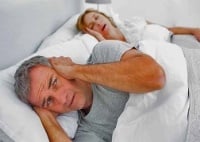
Obstructive sleep apnea (OSA) is a condition that involves repeated episodes of either partial or complete blockage of the airway during sleep. The body identifies this as a “choking phenomenon,” raising blood pressure, and slowing heart rate. Blood oxygen levels may also drop during an apnea episode.
In a recent article in Neurology, snoring could be harming your brain’s health long term. With a higher chance of stroke, Alzheimer’s disease, or overall cognitive decline, obstructed breathing and intense, loud snoring is not wise to ignore.
“Tiny lesions on the brain, known as white matter hyperintensities, are biomarkers that indicate brain health, becoming more prevalent with age or uncontrolled high blood pressure.” The study found higher hyperintensities in sleep apnea patients with an equivalency of brain aging of 2.3 years. “The same 10% reduction of deep sleep was also associated with reducing the integrity of axons, and that decrease was similar to the effect of the brain appearing 3 years older.”
However, it is important to know that OSA isn’t experienced by only adults. In fact, many children, especially those with irregular schedules and other health conditions, suffer from OSA as well leading to trouble at home and in school.
OSA in Children
Obstructive sleep apnea (OSA) is a common, serious condition in adults, but it is also a condition in children that can lead to learning, behavior, growth, and heart problems. According to the American Sleep Apnea Association, symptoms and signs in children suffering from OSA can include:
- snoring
- long pauses in breathing
- tossing and turning in bed
- chronic mouth breathing during sleep
- night sweats
Between the ages of two and eight years old, only one to five percent of children are diagnosed. Studies have shown if left untreated, sleep apnea in children can lead to issues later in life like attention-deficit hyperactivity disorder. In fact, as many as 25 percent of these cases may have symptoms of OSA. Learning difficulties, behavioral issues, bed-wetting, obesity, sleep-walking, and other hormonal and metabolic problems can be the consequences of chronic fragmented sleep like OSA.
Consequences of undiagnosed sleep apnea affect more than a restful night. Their social
behavior could produce more fights with friends or behavior issues due to inattentiveness and moodiness. Sleep apnea can result in slower growth and development due to not producing enough growth hormone. Obesity can also contribute to the list of health issues causing your child to have higher resistance to insulin as well as feeling fatigued during the day.
A part of the high risk that is ignored by many parents is obesity. Diet and weight loss could even be needed along with dietary counseling if obesity complicates the situation preventing surgery. In one study, 71 percent of elementary-aged participants who went to bed later than suggested were linked with obesity. This tended to be due to eating dinner late and watching more television with families that do not have a normal routine.
OSA in Children and Adults: Next Steps
For the parents who rather get to the bottom of the “why this is happening” versus the “how can we fix it and get back to sleeping for seven solid hours,” what are the solutions?
- Assess the situation. It could simply be nightmares or a recurring dream. But more than likely if you are moving into years of an issue rather than weeks, assess your child’s bedtime routine. Ask yourself the tough questions.
- Deflecting is never the answer. Make sure to nip your child’s issues in the bud. Say no to a third drink of water. Buy the nightlight that will help them sleep. Do not sacrifice your space in bed for your child to join you every night by crawling in between mommy and daddy.
- Talk to your pediatrician. Keep your doctor updated on your child’s sleep patterns. This is your coach to help solve the problem. No, they are not available every night at 3 a.m. but you can keep a journal of the problems and report back for some options.
If you find yourself dozing off while reading, watching TV, talking to someone, sitting in the classroom, or in traffic, sleep deprivation may be the reason. The best course of action is to start journaling when you find yourself falling asleep or dozing off.
- What to track for your doctor could be helpful as well:
- Wake up and bedtime
- The last time and meal you last ate
- The season and room temperature
- How tired you were at work
- The last drink you took (water, caffeine)
- Any medications you took
- Time of day and amount of exercise during the day
For others, it is not as simple when you are traveling the long road to a solution. The sleep experts at Alaska Sleep Clinic are here to help. We have trained staff who help parents find treatment for sleep apnea. If you live in Alaska and have a child suffering from OSA, request a free 10-minute phone consultation with our sleep experts and schedule a sleep study.







